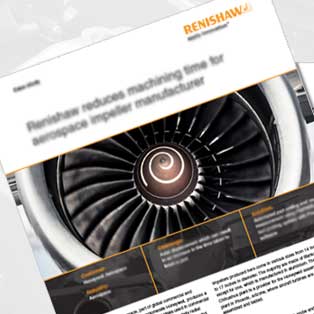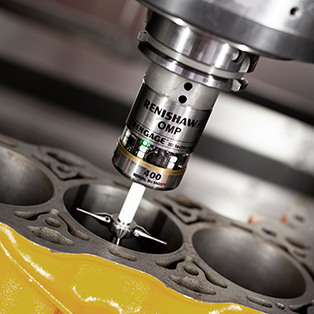Precyzyjna produkcja — analizy przypadków
Nasze systemy pomiarowe pomagają producentom w zmaksymalizowaniu produktywności, skróceniu czasu poświęconego na produkcję i kontrolę przedmiotów, a także w utrzymaniu niezawodnej pracy maszyn. W dziedzinach automatyki przemysłowej i układów dynamicznych nasze systemy do pomiaru położenia i systemy kalibracyjne pozwalają producentom maszyn na wytwarzanie niezawodnych produktów o wysokiej dokładności.
Wytwarzanie wraz ze sterowaniem procesem
Wyzwanie: Skrócenie czasu pomiaru błędów związanych z precyzją przestrzenną.
Dowiedz się więcejWyzwanie: Usunięcie wąskiego gardła w kontroli części, z jednoczesnym zapoznaniem studentów NIMS z procesem precyzyjnych pomiarów.
Dowiedz się więcejWyzwanie: Ograniczenie ręcznej interwencji w celu poprawy jakości podzespołów w produkcji wielkoseryjnej.
Dowiedz się więcejWyzwanie: Usprawnienie organizacji pracy klientów przez połączenie projektu z obrabiarką za pomocą Fusion 360 i drukowania 3D przy użyciu metalu.
Dowiedz się więcejWyzwanie: Skuteczne zbieranie danych dotyczących wydajności i kalibracji obrabiarek w celu rozszerzenia oferty usług dla klientów.
Dowiedz się więcejPodsumowanie: Przykład producenta stosującego innowacyjne systemy pomiarów, oprzyrządowanie i mocowania w celu zapewnienia kompleksowej obróbki odlewów na tokarce.
Dowiedz się więcejWyzwanie: Zwiększenie ogólnej wydajności, skrócenie czasu realizacji zamówień i zminimalizowanie wpływu błędów ludzkich.
Dowiedz się więcejWyzwanie: Branża hydrauliki siłowej: produkcja takich zaworów, które mają większą sprawność, są zrównoważone, ekonomiczne, a także zapobiegają stratom milionów ton CO2 rocznie.
Dowiedz się więcejWyzwanie: Reagowanie na szybko zmieniające się wymagania klientów, które są coraz bardziej złożone i mniej przewidywalne
Dowiedz się więcejWyzwanie: Automatyzacja procesów kontroli i zwiększenie zdolności produkcyjnych
Dowiedz się więcejWyzwanie: Ciągłe doskonalenie procesu weryfikacji przedmiotu obrabianego, aby sprostać wymaganiom projektów o złożonych kształtach geometrycznych.
Dowiedz się więcejWyzwanie: Wybór przyszłościowego systemu wytwarzania przyrostowego do elastycznej, wysokojakościowej produkcji gotowych części.
Dowiedz się więcejWyzwanie: Eliminacja nierównomiernego wykończenia całej serii kół zębatych spowodowanego ręcznym gratowaniem.
Dowiedz się więcejWyzwanie: Nieefektywny i kosztowny proces wymaga zastosowania różnych przyrządów do pomiaru poszczególnych parametrów.
Dowiedz się więcejWyzwanie: Zwiększenie wydajności pomiarów poprzez przeniesienie wszystkich zadań pomiarowych do jednego systemu.
Dowiedz się więcejWyzwanie: Projektowanie i produkcja pokrywy z włókna szklanego do kokpitu samochodu wyścigowego.
Dowiedz się więcejWyzwanie: Utrzymanie dokładności 15–20 mikronów i zmniejszenie czasu przestoju podczas obróbki odlewów aluminiowych.
Dowiedz się więcejWyzwanie: Kontrola geometrii wysokiej klasy centrów obróbki przed i po przeprowadzce do nowego budynku.
Dowiedz się więcejWyzwanie: Skrócenie czasu przestojów, zmniejszenie ilości braków i kosztów kontroli
Dowiedz się więcejWyzwanie: Zmniejszenie błędów pozycjonowania spowodowanych szumem znacząco poprawia parametry narzędzia.
Dowiedz się więcejWyzwanie: Zastąpienie ręcznej produkcji zaawansowanych podzespołów rowerowych.
Dowiedz się więcejWyzwanie: Szybka i dokładna obróbka odlewów aluminiowych naczyń kuchennych o szerokich tolerancjach.
Dowiedz się więcejTowary konsumpcyjne
Wyzwanie: Szybka iteracja projektów w celu poprawy parametrów kierownicy nowego olimpijskiego roweru torowego i produkcja dostosowanych części metalowych dla poszczególnych sportowców.
Dowiedz się więcejWyzwanie: Przejście od podzlecania wytwarzania przyrostowego na zewnątrz do produkcji we własnym zakresie.
Dowiedz się więcejWyzwanie: Zwiększenie wydajności istniejących urządzeń do formowania wtryskowego.
Dowiedz się więcejWyzwanie: Przejście od podzlecania wytwarzania przyrostowego na zewnątrz do produkcji we własnym zakresie. Uproszczenie wykańczania wysokiej klasy elementów zegarka.
Dowiedz się więcejWyzwanie: Zmiana produkcji zewnętrznej (zleconej) na własną odlewanych próżniowo części do wyciskarki do soków
Dowiedz się więcejWyzwanie: Produkowany na zamówienie rower 2-kołowy dostosowany do sylwetki i stylu jazdy użytkownika.
Dowiedz się więcejWyzwanie: Maksymalizacja czasu pracy i zapewnienie spójności precyzji podzespołów.
Dowiedz się więcejWyzwanie: Wyprodukowanie pierwszej na świecie ramy rowerowej w technologii drukowania metalu 3D.
Dowiedz się więcejAutomatyzacja przemysłu
Wyzwanie: Utrzymanie stałej prędkości jest niezbędne w wielu zaawansowanych procesach przemysłowych. W tradycyjnych konstrukcjach silników występują wahania momentu, które są przyczyną falowania prędkości silnika.
Dowiedz się więcejWyzwanie: Szybki rozwój nowych technologii, takich jak AI i IoT, postawił producentów OEM w obliczu wyzwania — zaprojektowania nowych urządzeń produkcyjnych, które obsłużą najnowsze, zaawansowane półprzewodniki.
Dowiedz się więcejWyzwanie: Nowa rodzina zaawansowanych silników DDR wymagała absolutnego enkodera obrotowego zgodnego ze ścisłymi ograniczeniami rozmiaru i wymagającymi wymaganiami pod względem parametrów roboczych.
Dowiedz się więcejWyzwanie: Firma JUSTEK potrzebowała szeregu niestandardowych rozwiązań sprzężenia zwrotnego wykorzystujących enkodery w precyzyjnych urządzeniach technologicznych przeznaczonych dla przemysłu półprzewodnikowego i FPD.
Dowiedz się więcejWyzwanie: Zwiększenie ogólnej konkurencyjności produktów firmy, w tym opracowanie stołu obrotowego z precyzyjnym napędem do rozwoju maszyn precyzyjnych.
Dowiedz się więcejWyzwanie: Zwiększenie stabilności pozycjonowania i regulacji przy niskich prędkościach.
Dowiedz się więcejWyzwanie: Enkoder, którego można używać nawet w ciężkich warunkach atmosferycznych i w miejscu instalacji.
Dowiedz się więcejFormy i matryce
Wyzwanie: Skrócenie czasu poświęcanego przez operatorów obrabiarek na ręczne ustawianie przedmiotów obrabianych, narzędzi i sond.
Dowiedz się więcejWyzwanie: Wyeliminowanie ludzkiego błędu w produkcji złożonych maszyn do formowania wtryskowego.
Dowiedz się więcejWyzwanie: Skrócenie czasu ustawiania części w produkcji części formowanych wtryskowo.
Dowiedz się więcejWyzwanie: Osiągnięcie 85% redukcji czasu inspekcji części formowanych wtryskowo.
Dowiedz się więcejWięcej przykładów zastosowań
-
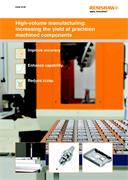 Case brief: High-volume manufacturing - increasing the yield of precision machined components [en]
Case brief: High-volume manufacturing - increasing the yield of precision machined components [en]

Case brief: High-volume manufacturing - increasing the yield of precision machined components
Generic case brief highlighting the production and process challenges faced by high volume manufacturing companies, how Renishaw systems helped overcome these challenges and the benefits of installing Renishaw systems.
[1.6MB] -
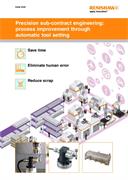 Case brief: Precision sub-contract engineering: process improvement through automatic tool setting [en]
Case brief: Precision sub-contract engineering: process improvement through automatic tool setting [en]

Case brief: Precision sub-contract engineering: process improvement through automatic tool setting
Case brief highlighting the challenges faced by a British sub-contractor (QEP) when producing a wide variety of products and how Renishaw systems helped overcome them.
[1.3MB] -
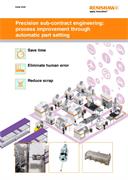 Case brief: Precision sub-contract engineering: process improvement through automatic part setting [en]
Case brief: Precision sub-contract engineering: process improvement through automatic part setting [en]

Case brief: Precision sub-contract engineering: process improvement through automatic part setting
Case brief highlighting the challenges faced by a British sub-contractor (QEP) when producing a wide variety of products and how Renishaw systems helped overcome them.
[1.4MB] -
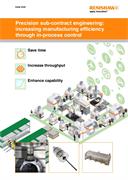 Case brief: Precision sub-contract engineering: increasing manufacturing efficiency through in-process control [en]
Case brief: Precision sub-contract engineering: increasing manufacturing efficiency through in-process control [en]

Case brief: Precision sub-contract engineering: increasing manufacturing efficiency through in-process control
Case brief highlighting the challenges faced by a British sub-contractor (QEP) when producing a wide variety of products and how Renishaw systems helped overcome them.
[1.5MB] -
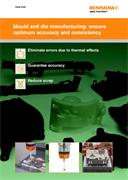 Case brief: Mould and die manufacturing: ensure optimum accuracy and consistency [en]
Case brief: Mould and die manufacturing: ensure optimum accuracy and consistency [en]

Case brief: Mould and die manufacturing: ensure optimum accuracy and consistency
Case brief highlighting the challenges faced by an British end user (BK Tooling) when producing high quality mould tools and how Renishaw systems helped overcome them.
[1.4MB] -
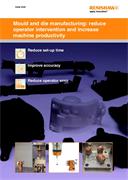 Case brief: Mould and die manufacturing: reduce operator intervention and increase machine productivity [en]
Case brief: Mould and die manufacturing: reduce operator intervention and increase machine productivity [en]

Case brief: Mould and die manufacturing: reduce operator intervention and increase machine productivity
Case brief highlighting the challenges faced by an British end user (BK Tooling) when producing high quality mould tools and how Renishaw systems helped overcome them.
[1.5MB]
Następne kroki
Dowiedz się więcej
